北师大版(2019) 选择性必修第一册 Unit 1 Relationships Lesson 3 课件 (28张ppt)
文档属性
| 名称 | 北师大版(2019) 选择性必修第一册 Unit 1 Relationships Lesson 3 课件 (28张ppt) | 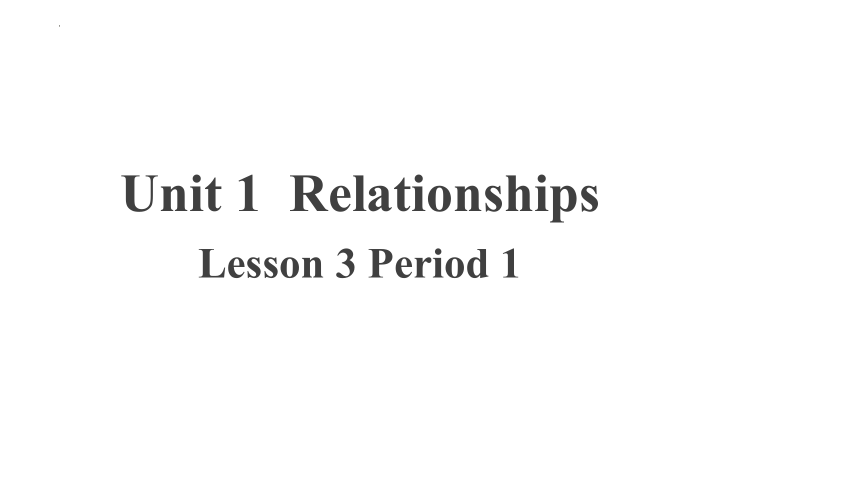 | |
| 格式 | pptx | ||
| 文件大小 | 1.8MB | ||
| 资源类型 | 教案 | ||
| 版本资源 | 北师大版(2019) | ||
| 科目 | 英语 | ||
| 更新时间 | 2022-12-27 11:49:50 | ||
图片预览


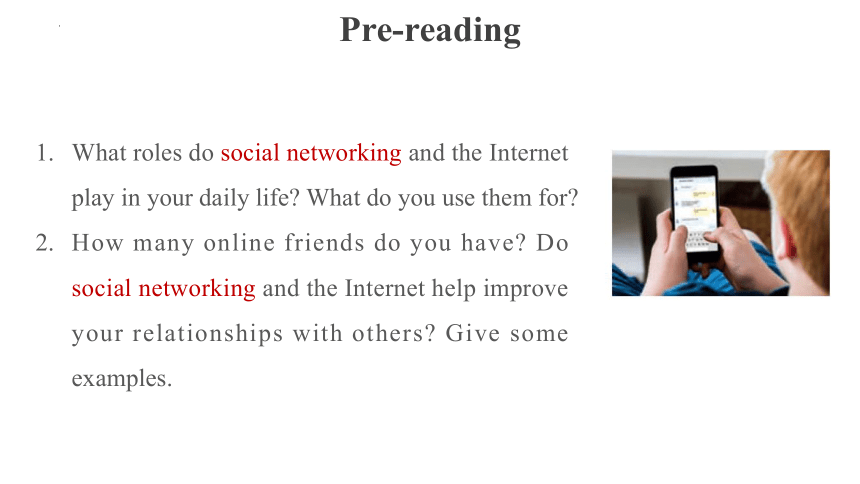
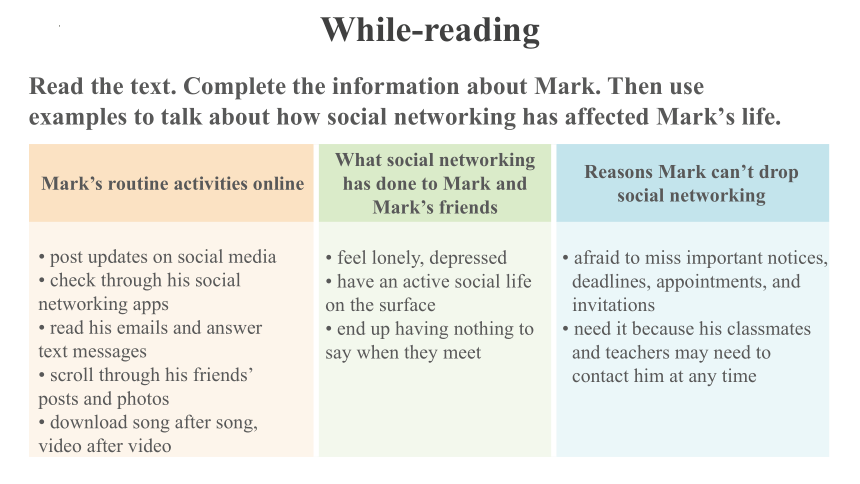


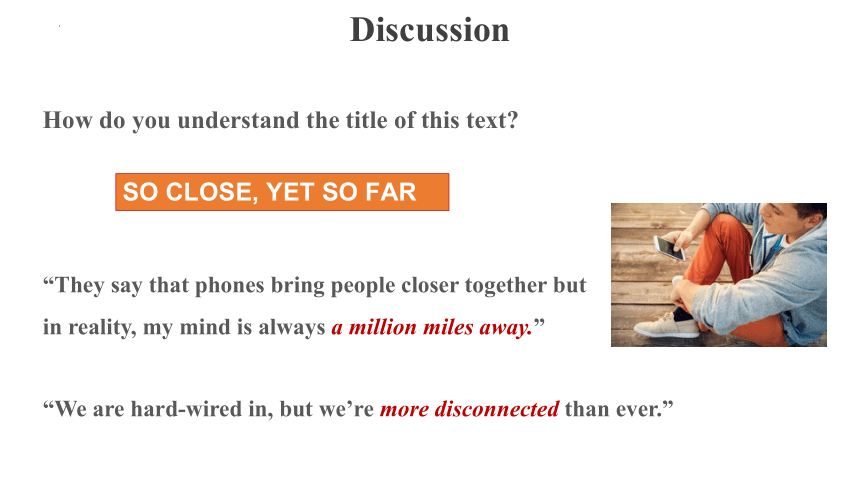
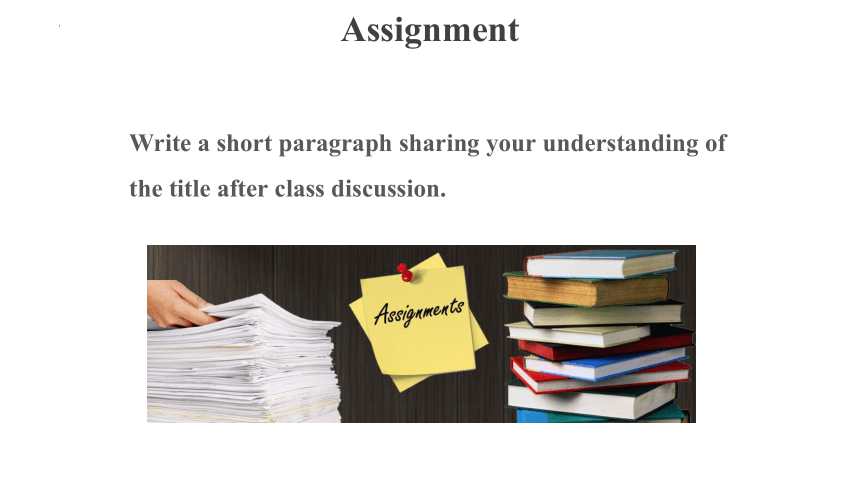
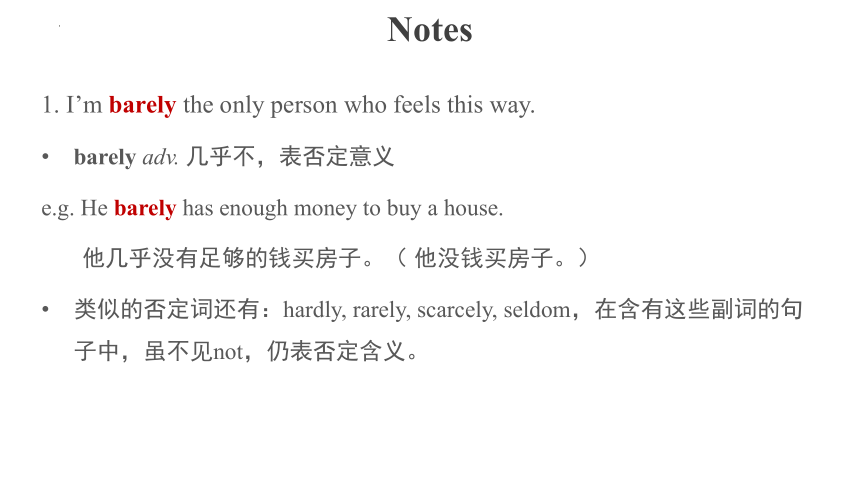
文档简介
(共28张PPT)
Unit 1 Relationships
Lesson 3 Period 1
Warming-up
We can’t live without cellphones!
Pre-reading
What roles do social networking and the Internet play in your daily life What do you use them for
How many online friends do you have Do social networking and the Internet help improve your relationships with others Give some examples.
While-reading
Read the plete the information about Mark. Then use examples to talk about how social networking has affected Mark’s life.
Mark’s routine activities online What social networking has done to Mark and Mark’s friends Reasons Mark can’t drop social networking
post updates on social media
check through his social networking apps
read his emails and answer text messages
scroll through his friends’ posts and photos
download song after song, video after video
feel lonely, depressed
have an active social life on the surface
end up having nothing to say when they meet
afraid to miss important notices,
deadlines, appointments, and
invitations
need it because his classmates
and teachers may need to
contact him at any time
Read the passage again and try to find out about what phenomena show social-networking makes the people’s relationships close / far-away.
List the phenomena showing people’s relationships close:
While-reading
1. If you are one of my 500 friends online, you’ll be the first to know.
2. I have a never-ending flow of messages from all the people online.
3. 2/3 of young people find it easier to make friends online.
4. It is funny that my friends and I chatter away online so much.
5. When we get together ... sb. take a call for 30 minutes; some text friends online
List the phenomena showing people’s relationships far-away:
While-reading
1. I attend parties and play sports, but I am always distracted.
2. I can’t remember the birthdays of some of my old mates.
3. But we end up having nothing to say when we meet.
4. When we get together ... ignore the ones who sit in front of them.
Why does social networking that intends to bring people close actually drive close friends away
Because social networking keeps you always online. You focus on the online world, and finally ignore people around you. Besides, you are used to chatting with friends online instead of meeting them in real world, which drives each other apart.
How do you understand the title of this text
SO CLOSE, YET SO FAR
“We are hard-wired in, but we’re more disconnected than ever.”
“They say that phones bring people closer together but in reality, my mind is always a million miles away.”
Discussion
Assignment
Write a short paragraph sharing your understanding of the title after class discussion.
1. I’m barely the only person who feels this way.
barely adv. 几乎不,表否定意义
e.g. He barely has enough money to buy a house.
他几乎没有足够的钱买房子。( 他没钱买房子。)
类似的否定词还有:hardly, rarely, scarcely, seldom,在含有这些副词的句子中,虽不见not,仍表否定含义。
Notes
2. I’m way beyond a shy or reserved person ...
way adv. (used with a prep. or an adv. and usually not negatively) (与介词或副词连用, 通常不用于否定句)大大地、远远地
e.g. She finished the race way ahead of the other runners.
她第一个跑到终点, 远远领先于其他选手。
The price is way above what we can afford.
价格高得我们绝对付不起。
Notes
3. ..., but we end up having nothing to say when we meet.
end up: reach or come to a certain place, state or action, esp. by a lengthy route or process 到达或来到某处,达到某状态或采取某行动(尤指经一长路程或过程)
e.g. At first he refused to accept any responsibility but he ended up apologizing.
最初他拒不承认有任何责任, 到头来还是道了歉。
Notes
4. ...; not once did she lift her head to enjoy the view outside her window.
did she lift 为谓语动词倒装结构
当否定词 never,little,few,rarely,scarcely,hardly,barely,seldom,neither,nor,not only,not,no 等位于句首时,采用部分倒装句式。
e.g. Little did he say at the meeting.
在会上他几乎没说话。
Never shall I forget the day when I joined the army.
我永远不会忘记我参军的那一天。
In no case will I tell a lie in future.
以后我绝不说谎。
Notes
Retell the story of Mark based on the information chart from the last period.
Mark’s routine activities online What social networking has done to Mark and Mark’s friends Reasons Mark can’t drop social networking
post updates on social media
check through his social networking apps
read his emails and answer text messages
scroll through his friends’ posts and photos
download song after song, video after video
feel lonely, depressed
have an active social life on the surface
end up having nothing to say when they meet
afraid to miss important notices,
deadlines, appointments, and
invitations
need it because his classmates
and teachers may need to
contact him at any time
Recalling
Detailed-reading
Find the expressions or sentences in the text that tell you the information.
1. Mark is always close to his phone and laptop.
2. He receives news from his friends online throughout the day.
3. His phone is not helping his relationships with his friends.
“My phone and my laptop are never out of touching distance.”
“I have a never-ending flow of messages and updates ...”
“They say that phones bring people closer together but in reality, my mind is always a million miles away.”
4. He has friends that he has known for years.
“... but I can’t remember the birthdays of some of my oldest mates.”
5. He is addicted to the Internet because it makes him feel excited and active.
“I will start doing my homework at 8 pm, and aim to finish in two hours. At 7:50 pm, I’m still scrolling through my friends’ silly posts and photos. I download song after song, video after video, but I’m not really paying attention. The stimulation is in chasing after the next song rather than truly enjoying it.”
6. His friends did not concentrate fully when they were having dinner together.
“Some spent the dinner bent over their phone, texting friends online but ignoring the ones who sat right in front of them.”
7. He and his friends can’t give up social networking.
“I need it for my studies because my teachers and classmates need to contact me at any time.”
Detailed-reading
Guessing the Meaning of Unfamiliar Words from the Context
Skill Builder
When you come across a difficult word / phrase in a text, try to guess what it means first before looking it up.
Read the sentence the word is in and decide what type of word it is, e.g. noun, verb.
Read the paragraph the word is in and try to work out the meaning from the context.
Then use a dictionary to check the exact meaning of the word.
Detailed-reading
1. way beyond (line 13) = a short way past / a long way past
2. go cold turkey (lines 43-44) = do something less frequently/ stop doing something completely
3. booze (line 47) = alcoholic drinks / soft drinks
4. be hard-wired in (line 49) = be born with the character / work like a computer
Read the text again. Choose the correct meaning of the colloquial phrases.
Detailed-reading
Think and share
Group Work
1. Why does Mark say “They say that phones bring people closer together but in reality, my mind is always a million miles away.”
Find examples from the text to illustrate how phones drive people further away.
2. How do you understand “We are hard-wired in, but we’re more disconnected than ever.”
Why does Mark say we are more disconnected than ever
Text Type
The text type of this piece of writing is a web blog, which uses a mixture of exposition and description.
Its purpose is to tell young readers that social networking on the Internet is causing distance and disconnection in real life relationships through the detailed description of Mark’s experience and feelings.
Decide what text type this piece of writing is. What is its communicative purpose
Mark’s use of language:
(1) asking rhetorical questions, e.g. “Where am I What am I doing ”
(2) irony, e.g. most of the words in the second paragraph describe how busy he is but then he ends the paragraph with the truth of being lonely, which is a sharp contrast.
(3) using examples to support his ideas, like the dinner get-together to show that friends say nothing in real life.
(4) the use of “I” to start a sentence, which is typical of personal blogs.
What impresses you the most about Mark’s use of language
Find examples from the text to support your idea.
Text Type
Figurative Language
Rhetorical questions are a type of figurative language — they are questions that have another layer of meaning on top of their literal meaning. To put it simply, a rhetorical question is posed to make a point, not because you want an answer.
Irony is a type of figurative language. In literary circumstances, irony is the situation in which someone says or does something, but means another thing or intends for something else to happen that would be contrary to thought.
Contrast is a rhetorical device through which writers identify differences between two subjects, places, persons, things, or ideas. Simply, it is a type of opposition between two objects, highlighted to emphasize their differences.
Reading Circles
Reading Circles
Discussion Leader
Summariser
Word Master
Student Advisor
Group Work
Work in groups of four. Choose a role and complete the task independently. Then share your work with the other members of your group before sharing in class.
Reading Circles
Think of two open-ended questions and write down your answers to them.
Ask your group members the same two questions and invite them to answer before giving them your answers.
Ask your group if they have any other questions to add.
Allow each member to share their own work with the group.
Make sure that each person is well-prepared for a class presentation.
Your report:
Question 1 ________________________________________________
My answer:________________________________________________
Question 2 ________________________________________________
My answer:________________________________________________
Discussion Leader
Reading Circles
Find three expressions in the text to describe Mark’s problems (such as actions, situations or feelings). Explain each expression in English.
Tell why you have chosen them.
Use each expression in a new sentence to describe a situation, an action or feeling that you or your friends may have.
Invite your group members to comment on your new sentences.
Your report may go like this:
I have chosen three expressions from the text. The first one is _______ on page _______ line _______. It means _______________. I chose it because it __________. Here is my sentence: _______________________________.
What do you think of it
Word Master
Reading Circles
Read the text carefully and summarise it including each of the following aspects:
a) What is the situation / problem _______________
b) What effects has the problem had _______________
c) What is the writer’s attitude and conclusion _______________
Share your summary, and then ask your group to comment on it.
Your report may go like this:
Here is my summary of the passage. Mark is a university student. His problem is: _______________. As a result _______________. Although Mark doesn’t like the way he lives and wants to give up the habit, but _______________.
Summariser
Reading Circles
Suppose you work at a Student Advice Centre. Mark and his friends come to you for help regarding their problems.
Discuss the consequences of their problems and explain why these problems arise.
Give at least three pieces of advice on how to overcome their problems.
Your report may go like this:
Thank you for sharing with me your problems. In fact, you are not the only one with these problems. The problems may however lead to some serious consequences. For example, _______________. For these reasons, I would suggest that first, you _______________; secondly, ...
Student Advisor
Reflect on the story of Mark: What have you learnt from it
Write a short paragraph sharing your thoughts.
Assignment
Goodbye!
Unit 1 Relationships
Lesson 3 Period 1
Warming-up
We can’t live without cellphones!
Pre-reading
What roles do social networking and the Internet play in your daily life What do you use them for
How many online friends do you have Do social networking and the Internet help improve your relationships with others Give some examples.
While-reading
Read the plete the information about Mark. Then use examples to talk about how social networking has affected Mark’s life.
Mark’s routine activities online What social networking has done to Mark and Mark’s friends Reasons Mark can’t drop social networking
post updates on social media
check through his social networking apps
read his emails and answer text messages
scroll through his friends’ posts and photos
download song after song, video after video
feel lonely, depressed
have an active social life on the surface
end up having nothing to say when they meet
afraid to miss important notices,
deadlines, appointments, and
invitations
need it because his classmates
and teachers may need to
contact him at any time
Read the passage again and try to find out about what phenomena show social-networking makes the people’s relationships close / far-away.
List the phenomena showing people’s relationships close:
While-reading
1. If you are one of my 500 friends online, you’ll be the first to know.
2. I have a never-ending flow of messages from all the people online.
3. 2/3 of young people find it easier to make friends online.
4. It is funny that my friends and I chatter away online so much.
5. When we get together ... sb. take a call for 30 minutes; some text friends online
List the phenomena showing people’s relationships far-away:
While-reading
1. I attend parties and play sports, but I am always distracted.
2. I can’t remember the birthdays of some of my old mates.
3. But we end up having nothing to say when we meet.
4. When we get together ... ignore the ones who sit in front of them.
Why does social networking that intends to bring people close actually drive close friends away
Because social networking keeps you always online. You focus on the online world, and finally ignore people around you. Besides, you are used to chatting with friends online instead of meeting them in real world, which drives each other apart.
How do you understand the title of this text
SO CLOSE, YET SO FAR
“We are hard-wired in, but we’re more disconnected than ever.”
“They say that phones bring people closer together but in reality, my mind is always a million miles away.”
Discussion
Assignment
Write a short paragraph sharing your understanding of the title after class discussion.
1. I’m barely the only person who feels this way.
barely adv. 几乎不,表否定意义
e.g. He barely has enough money to buy a house.
他几乎没有足够的钱买房子。( 他没钱买房子。)
类似的否定词还有:hardly, rarely, scarcely, seldom,在含有这些副词的句子中,虽不见not,仍表否定含义。
Notes
2. I’m way beyond a shy or reserved person ...
way adv. (used with a prep. or an adv. and usually not negatively) (与介词或副词连用, 通常不用于否定句)大大地、远远地
e.g. She finished the race way ahead of the other runners.
她第一个跑到终点, 远远领先于其他选手。
The price is way above what we can afford.
价格高得我们绝对付不起。
Notes
3. ..., but we end up having nothing to say when we meet.
end up: reach or come to a certain place, state or action, esp. by a lengthy route or process 到达或来到某处,达到某状态或采取某行动(尤指经一长路程或过程)
e.g. At first he refused to accept any responsibility but he ended up apologizing.
最初他拒不承认有任何责任, 到头来还是道了歉。
Notes
4. ...; not once did she lift her head to enjoy the view outside her window.
did she lift 为谓语动词倒装结构
当否定词 never,little,few,rarely,scarcely,hardly,barely,seldom,neither,nor,not only,not,no 等位于句首时,采用部分倒装句式。
e.g. Little did he say at the meeting.
在会上他几乎没说话。
Never shall I forget the day when I joined the army.
我永远不会忘记我参军的那一天。
In no case will I tell a lie in future.
以后我绝不说谎。
Notes
Retell the story of Mark based on the information chart from the last period.
Mark’s routine activities online What social networking has done to Mark and Mark’s friends Reasons Mark can’t drop social networking
post updates on social media
check through his social networking apps
read his emails and answer text messages
scroll through his friends’ posts and photos
download song after song, video after video
feel lonely, depressed
have an active social life on the surface
end up having nothing to say when they meet
afraid to miss important notices,
deadlines, appointments, and
invitations
need it because his classmates
and teachers may need to
contact him at any time
Recalling
Detailed-reading
Find the expressions or sentences in the text that tell you the information.
1. Mark is always close to his phone and laptop.
2. He receives news from his friends online throughout the day.
3. His phone is not helping his relationships with his friends.
“My phone and my laptop are never out of touching distance.”
“I have a never-ending flow of messages and updates ...”
“They say that phones bring people closer together but in reality, my mind is always a million miles away.”
4. He has friends that he has known for years.
“... but I can’t remember the birthdays of some of my oldest mates.”
5. He is addicted to the Internet because it makes him feel excited and active.
“I will start doing my homework at 8 pm, and aim to finish in two hours. At 7:50 pm, I’m still scrolling through my friends’ silly posts and photos. I download song after song, video after video, but I’m not really paying attention. The stimulation is in chasing after the next song rather than truly enjoying it.”
6. His friends did not concentrate fully when they were having dinner together.
“Some spent the dinner bent over their phone, texting friends online but ignoring the ones who sat right in front of them.”
7. He and his friends can’t give up social networking.
“I need it for my studies because my teachers and classmates need to contact me at any time.”
Detailed-reading
Guessing the Meaning of Unfamiliar Words from the Context
Skill Builder
When you come across a difficult word / phrase in a text, try to guess what it means first before looking it up.
Read the sentence the word is in and decide what type of word it is, e.g. noun, verb.
Read the paragraph the word is in and try to work out the meaning from the context.
Then use a dictionary to check the exact meaning of the word.
Detailed-reading
1. way beyond (line 13) = a short way past / a long way past
2. go cold turkey (lines 43-44) = do something less frequently/ stop doing something completely
3. booze (line 47) = alcoholic drinks / soft drinks
4. be hard-wired in (line 49) = be born with the character / work like a computer
Read the text again. Choose the correct meaning of the colloquial phrases.
Detailed-reading
Think and share
Group Work
1. Why does Mark say “They say that phones bring people closer together but in reality, my mind is always a million miles away.”
Find examples from the text to illustrate how phones drive people further away.
2. How do you understand “We are hard-wired in, but we’re more disconnected than ever.”
Why does Mark say we are more disconnected than ever
Text Type
The text type of this piece of writing is a web blog, which uses a mixture of exposition and description.
Its purpose is to tell young readers that social networking on the Internet is causing distance and disconnection in real life relationships through the detailed description of Mark’s experience and feelings.
Decide what text type this piece of writing is. What is its communicative purpose
Mark’s use of language:
(1) asking rhetorical questions, e.g. “Where am I What am I doing ”
(2) irony, e.g. most of the words in the second paragraph describe how busy he is but then he ends the paragraph with the truth of being lonely, which is a sharp contrast.
(3) using examples to support his ideas, like the dinner get-together to show that friends say nothing in real life.
(4) the use of “I” to start a sentence, which is typical of personal blogs.
What impresses you the most about Mark’s use of language
Find examples from the text to support your idea.
Text Type
Figurative Language
Rhetorical questions are a type of figurative language — they are questions that have another layer of meaning on top of their literal meaning. To put it simply, a rhetorical question is posed to make a point, not because you want an answer.
Irony is a type of figurative language. In literary circumstances, irony is the situation in which someone says or does something, but means another thing or intends for something else to happen that would be contrary to thought.
Contrast is a rhetorical device through which writers identify differences between two subjects, places, persons, things, or ideas. Simply, it is a type of opposition between two objects, highlighted to emphasize their differences.
Reading Circles
Reading Circles
Discussion Leader
Summariser
Word Master
Student Advisor
Group Work
Work in groups of four. Choose a role and complete the task independently. Then share your work with the other members of your group before sharing in class.
Reading Circles
Think of two open-ended questions and write down your answers to them.
Ask your group members the same two questions and invite them to answer before giving them your answers.
Ask your group if they have any other questions to add.
Allow each member to share their own work with the group.
Make sure that each person is well-prepared for a class presentation.
Your report:
Question 1 ________________________________________________
My answer:________________________________________________
Question 2 ________________________________________________
My answer:________________________________________________
Discussion Leader
Reading Circles
Find three expressions in the text to describe Mark’s problems (such as actions, situations or feelings). Explain each expression in English.
Tell why you have chosen them.
Use each expression in a new sentence to describe a situation, an action or feeling that you or your friends may have.
Invite your group members to comment on your new sentences.
Your report may go like this:
I have chosen three expressions from the text. The first one is _______ on page _______ line _______. It means _______________. I chose it because it __________. Here is my sentence: _______________________________.
What do you think of it
Word Master
Reading Circles
Read the text carefully and summarise it including each of the following aspects:
a) What is the situation / problem _______________
b) What effects has the problem had _______________
c) What is the writer’s attitude and conclusion _______________
Share your summary, and then ask your group to comment on it.
Your report may go like this:
Here is my summary of the passage. Mark is a university student. His problem is: _______________. As a result _______________. Although Mark doesn’t like the way he lives and wants to give up the habit, but _______________.
Summariser
Reading Circles
Suppose you work at a Student Advice Centre. Mark and his friends come to you for help regarding their problems.
Discuss the consequences of their problems and explain why these problems arise.
Give at least three pieces of advice on how to overcome their problems.
Your report may go like this:
Thank you for sharing with me your problems. In fact, you are not the only one with these problems. The problems may however lead to some serious consequences. For example, _______________. For these reasons, I would suggest that first, you _______________; secondly, ...
Student Advisor
Reflect on the story of Mark: What have you learnt from it
Write a short paragraph sharing your thoughts.
Assignment
Goodbye!
同课章节目录
- Unit 1 Relationshis
- Lesson 1 Teachers
- Lesson 2 How Do We Like Teachers’ Feedback?
- Lesson 3 So Close,Yet So Fa
- Unit 2 Success
- Lesson 1 Money vs Success
- Lesson 2 Top Five Secrets of Success
- Lesson 3 Getting to the Top
- Unit 3 Conservation
- Lesson 1 The Sixth Extinction
- Lesson 2 War on Plastic Packets
- Lesson 3 The Road to Destruction
